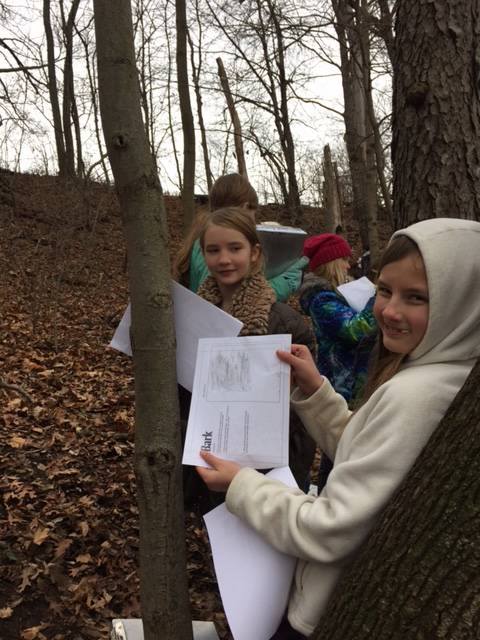
Students at Fox River Valley identify trees in the Ravine. (Photo courtesy of Fox River Academy)
By Kelly Koller, Fox River Academy (guest blogger)
Hidden amid the pulse and flurry of modern life, every city, village and countryside offers monuments, both natural and human-made, that weave together the rich fabric of history from thousands of years ago until today. For the students of Fox River Academy, that natural landmark is the Ravine. A refuge from the bustling downtown City of Appleton and an important sanctuary for wildlife in the sprawling development of the Fox Cities, the Ravine is home to what our students estimate is well over 500 species—and the occasional couple out for a peaceful walk. Since 2011, Fox River Academy students have worked with the City of Appleton to help restore the Ravine by removing invasive species, improving habitat areas, developing a trail and taking out garbage.
In the early 1900s Appleton, Wisconsin was known as the City of Ravines, though one would never know that by today’s landscape. This is part of what makes the Pierce Park Ravine so special. Thousands of years ago as the glaciers receded in Wisconsin, about 20 ravines were created from erosion in what came to be known as the Appleton area. Through urban development ravines were filled in—and some, like the Pierce Park Ravine, were used for garbage dumps. Today only a handful of ravine remnants remain and the Pierce Park Ravine is a five-acre, mostly forested parcel between Pierce Park and Lutz Park.
Over the past five years, students have created habitat for cliff swallows and bats in the Ravine, established a native prairie area for pollinators, tirelessly removed burdock, identified plant and tree species, tracked animals, and participated in mapping and orienteering activities. They have used the area as a lab for every subject. This year students are working on getting the Ravine registered as a school forest. Doing so will provide more support for learning activities for Fox River Academy students and students in other schools in the Appleton area. While it is a beautiful five-acre area, the Ravine is still recovering from heavy disturbance by human activity, and registering as a school forest also helps provide a plan for managing and restoring the area as we look to maintaining and protecting it in the future. Fox River Academy students and staff are currently working with Wisconsin Department of Natural Resources Forester Frank Kirschling on developing the plan, with hopes to have it approved by the City of Appleton and Appleton Area School District by the end of the school year.
The Ravine is a five-minute walk from our Fox River Academy and a priceless resource. The firsthand experiences students have in this wildlife area enrich learning in both the head and the heart. Experiencing wildlife, in addition to typical reading and classroom activities, creates opportunities for unexpected discoveries, new questions and connections, adventure and inspiration. I can’t imagine teaching without having the outdoors as a classroom. Technology is important in education, but it is imperative to remember that we a have a giant interactive classroom called the outdoors…and there’s no app for that!
In addition to the academic benefits, an outdoor classroom educates the students’ hearts in a subtle but perhaps even more meaningful way. When students experience the interdependence of organisms in nature, they not only understand the concept of respect and diversity, but they also practice it more readily. They have a mindset of eco-centrism instead of ego-centrism. They have a better ability to step back and see the big picture. To understand how humans interact with and depend on natural resources. To think of the community as a whole and see how their individual
experience fits in. Students today need all of these skills and perspectives in their future. The best part is that as long as the opportunity is available close by, the best classroom is free and right outside our doors.
